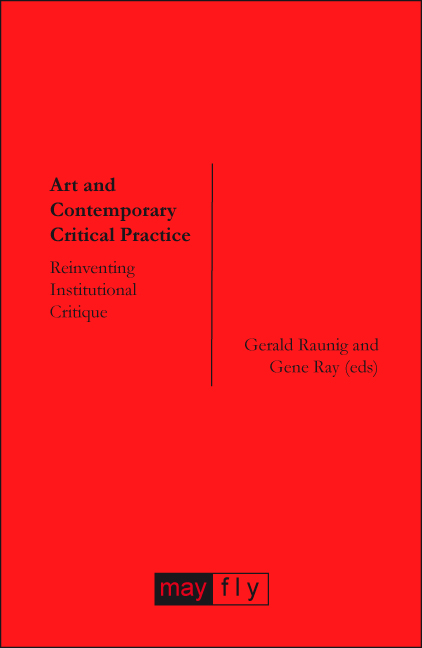Gerald Raunig, Gene Ray (eds): Art and Contemporary Critical Practice: Reinventing Institutional Critique (2009)
Filed under book | Tags: · art, contemporary art, critique, institutional critique, political theory

“‘Institutional critique’ is best known through the critical practice that developed in the late 1960s and early 1970s by artists and activists who presented radical challenges to the museum and gallery system. Since then it has been pushed in new directions by new generations exploring this legacy and developing the models of institutional critique in ways that go well beyond the field of art. The contributors to the eipcp-project transform as well as to the book that assembles some of the most important theoretical contributions to the project interrogate the shifting relations between ‘institutions’ and ‘critique’ proposing new concepts as ‘monster institutions’, ‘instituent practices’ and ‘institutions of exodus’.”
With texts by Boris Buden, Rosalyn Deutsche, Marcelo Expósito, Marina Garcés, Brian Holmes, Jens Kastner, Maurizio Lazzarato, Isabell Lorey, Nina Möntmann, Stefan Nowotny, Gerald Raunig, Gene Ray, Raúl Sánchez Cedillo, Simon Sheikh, Hito Steyerl, Universidad Nómada, and Paolo Virno.
Publisher: mayfly, London; in conjunction with the European Institute for Progressive Cultural Policies
Creative Commons licence
ISBN 9781906948023
266 pages
Michel Foucault: The Birth of Biopolitics: Lectures at the Collège de France, 1978-1979 (2008–) [EN, PT, CZ]
Filed under book | Tags: · biopolitics, governmentality, neoliberalism, philosophy, political economy, political theory, politics
Michel Foucault’s lectures at the Collège de France in 1979, The Birth of Biopolitics, pursue and develop further the themes of his lectures from the previous year, Security, Territory, Population. Having shown how Eighteenth century political economy marks the birth of a new governmental rationality – seeking maximum effectiveness by governing less and in accordance with the naturalness of the phenomena to be governed – Michel Foucault undertakes the detailed analysis of the forms of this liberal governmentality. This involves describing the political rationality within which the specific problems of life and population were posed: “Studying liberalism as the general framework of biopolitics”.
What are the specific features of the liberal art of government as they were outlined in the Eighteenth century? What crisis of governmentality characterises the present world and what revisions of liberal government has it given rise to? This is the diagnostic task addressed by Foucault’s study of the two major twentieth century schools of neo-liberalism: German ordo-liberalism and the neo-liberalism of the Chicago School. In the years he taught at the Collège de France, this was Michel Foucault’s sole foray into the field of contemporary history. This course thus raises questions of political philosophy and social policy that are at the heart of current debates about the role and status of neo-liberalism in twentieth century politics. A remarkable feature of these lectures is their discussion of contemporary economic theory and practice, culminating in an analysis of the model of homo oeconomicus.
Foucault’s analysis also highlights the paradoxical role played by “society” in relation to government. “Society” is both that in the name of which government strives to limit itself, but it is also the target for permanent governmental intervention to produce, multiply, and guarantee the freedoms required by economic liberalism. Far from being opposed to the State, civil society is thus shown to be the correlate of a liberal technology of government.
Edited by Michel Senellart
General Editors: François Ewald and Alessandro Fontana
Translated by Graham Burchell
Publisher Palgrave Macmillan, 2008
ISBN 140398655X, 9781403986559
346 pages
publisher (EN)
google books (EN)
The Birth of Biopolitics: Lectures at the Collège de France, 1978-1979 (English, trans. Graham Burchell, 2008, updated on 2013-9-26)
Nascimento da Biopolítica: Curso dado no Collège de France (1978-1979) (Portuguese, trans. Eduardo Brandão and Claudia Berliner, 2008, added on 2013-9-26)
Zrození biopolitiky: Kurz na Collège de France (1978-1979) (Czech, trans. Petr Horák, 2009, no OCR, added on 2013-9-26)
Georg Lukács: History and Class Consciousness: Studies in Marxist Dialectics (1923/1972)
Filed under book | Tags: · bourgeoisie, capitalism, communism, dialectic, economy, historical materialism, history, marxism, philosophy, political economy, political theory, proletariat, social democracy

Written between 1919 and 1922 and first published in 1923, History and Class Consciousness initiated the current of thought that came to be known as Western Marxism. The book is notable for contributing to debates concerning Marxism and its relation to sociology, politics and philosophy, and for reconstructing many elements of Marx’s theory of alienation before most of the works of the Young Marx, in which it is expounded, had been published. Lukács’s work elaborates and expands upon Marxist theories such as ideology, false consciousness, reification and class consciousness.
Originally published as Geschichte und Klassenbewußtsein, 1923.
First published in this edition by Merlin Press, London, 1971
Publisher MIT Press, 1972
ISBN 0262620200, 9780262620208
404 pages
Wikipedia
Publisher
Google books
PDF (23 MB, updated on 2014-9-5)
Comment (0)
